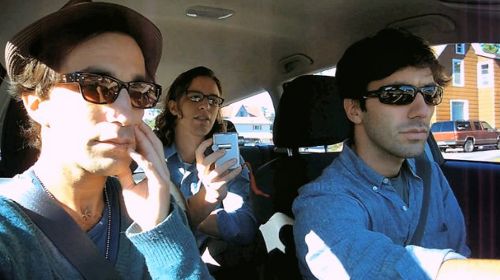Review: Catfish

The marketing campaign for the movie Catfish centers around "secrets" that are meant to intrigue you enough to see what's going on. It is suggested that people who have seen the film not spoil it by mentioning anything at all, not even the premise. If you like this way of seeing a movie, stop reading this review, and come back again after you've seen the film. I don't think that Catfish is the kind of movie that deserves a "the less you know, the better it is" review style. On the other hand, the more I think about it, the less I like it, so there may be some basis for that line of thought.
Nearly everyone is willing to share the film's setup: Filmmakers Henry Joost and Ariel Schulman share an office with photographer Nev Schulman, Ariel's brother. In 2008, Nev starts getting artwork in the mail -- paintings of his photos, and notes from an 8-year-old girl, Abby, who says she loves his photos and loves making art from them. Nev is interested, and starts a correspondence with Abby via the internet -- she sends him pictures and videos of her painting, he friends her entire family on Facebook. He also starts talking to some of Abby's family members on the phone. And then ... that's where I'm supposed to stop telling you about the storyline, lest I spoil anything.
That doesn't work for me. If you say "And then ..." and get all ominous, I am going to watch this film waiting for someone to leap out from the bushes with an axe. Or perhaps a chainsaw. I love going into movies knowing practically nothing (this is why you rarely see me writing about trailers; I like to avoid them), but somehow the lack of understanding what this movie was, and where it might go, was more annoying than thrilling. I truly was waiting for something brutal and fatal.
I won't give away the ending, or even the last hour, but essentially this is a story about the power of Facebook and other social media to provide a web of deception -- when we don't meet people in person, it's easy for them to mislead us about who they are and what they do. The three young men end up on an expedition to find out exactly what's true, after getting a clue that some of the music the family is sending them -- as their own performances -- is being lifted from other sources.
The last half hour of Catfish drags terribly, and I think the movie might have worked better as a short film, or at least as a shorter one. In addition, because the filmmakers are using fairly low-rent equipment, sometimes the picture is grainy and in one night sequence, so poor that we can't really see what's going on at all.
I admit to some surprise at the gullibility of Nev and the filmmakers, but that may reflect my own cynicism and experiences. I run a Google search on just about anyone. And then I don't necessarily believe what I find there, either.
And since I'm very suspicious about these kinds of things, I'm also suspicious about this "documentary." Is it really a documentary? My guess is that this experience may actually have happened to these guys, but I am skeptical that all the footage is genuine and that it occurs in the sequences presented in the film. In one sequence, one of the filmmakers brings in a hidden camera; but there appear to be camera angles that are not from the hidden camera's point of view. Some people are speculating that the filmmakers figured out what was going on long before they "figured it out" in the film, and decided to have some fun with the situation; I wouldn't disbelieve that, either.
And that's the real problem I had with Catfish -- some of the scenarios that seem plausible enough during the film tend to draw skepticism when you go home and perform your own internet searches on the film and the people involved with it. That's why I said that the more I think about this film, the less I like it. Perhaps that's the point -- the filmmakers are encouraging us not to believe what we see, just as they didn't in the context of the film. However, in interviews they strenuously argue that Catfish is a documentary and that nothing was faked -- they actually film themselves all the time, and got lucky.
So I'm stuck. Normally I like films that play with the boundaries between narrative and documentary -- Alex Karpovsky's The Hole Story and Woodpecker, for example, are both quite enjoyable. But I don't like being told something is a documentary that isn't -- or even might not be. When The Poughkeepsie Tapes screened at Butt-Numb-a-Thon in 2007, it was introduced as a documentary and that threw me off-balance and certainly contributed to my dislike of the film. That's how I felt the day after I saw Catfish ... like someone was trying to pull something over on me.
On the other hand, I want all of you to go see Catfish so we can have splendid discussions and arguments about what's real and what's not. Some people claim that the entire plot may have been taken from a recent real-life event, but I don't think it's that false -- this sort of thing does happen, and it happens very often. I have a story or two myself. I just wish we had a better, smarter movie to argue over.
Austin connections: A song by Austin musician Suzanna Choffel, which she performs in a video posted to YouTube, features prominently in a turning-point scene of the movie.

